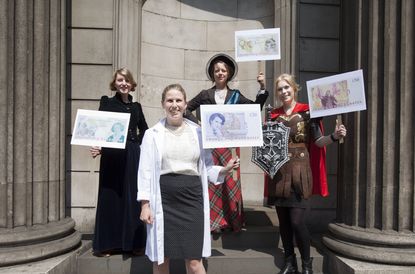The Twitter Boycott: All Your Questions Answered
While many saw yesterday's 24-hour Twitter Boycott as an important show of solidarity for the women who have recently received violent threats on the social media site, others felt that women should not silence themselves in the face of misogynistic abuse. Here, we give you the lowdown on the situation.

While many saw yesterday's 24-hour Twitter Boycott as an important show of solidarity for the women who have recently received violent threats on the social media site, others felt that women should not silence themselves in the face of misogynistic abuse. Here, we give you the lowdown on the situation.
What was the Twitter Boycott?
Yesterday, high-profile Twitter users including feminist journalist Caitlin Moran and comedian Sarah Millican, staged a 24-hour boycott of the social media site, using the hashtag ‘#twittersilence’. This was staged in response to the abusive tweets, including rape and bomb threats, which some female users, including the feminist campaigner Caroline Criado-Perez and MP Stella Creasy, received last week.
What was the response?
The boycott, as with anything on social media, sparked some controversy. While Moran and other participants saw it as a show of solidarity for the women who have been targeted, other users felt that female tweeters should respond to misogynistic threats by speaking up – rather than silencing themselves. Criado-Perez, whose campaign to get Jane Austen onto the £10 note sparked the abuse, tweeted ‘I choose 2 remain on twitter. I choose 2 #shoutback. And I choose not 2 stop even 4 a day.’ (sic)
Why did Criado-Perez and other high-profile female twitter users become targets of abuse?
The 28-year old feminist activist and freelance journalist became a target of abuse after successfully campaigning for Jane Austen to appear on the £10 note. She received a deluge of rape and death threats via Twitter for the next 48 hours. MP Stella Creasy spoke up in support of Criado-Perez and received a similar barrage of abusive tweets.
Marie Claire Newsletter
Celebrity news, beauty, fashion advice, and fascinating features, delivered straight to your inbox!
Trolls then went on to send bomb threats to female journalists, including Hadley Freeman and Grace Dent. The historian Mary Beard became the latest woman to receive bomb threats on Saturday.
What is motivating the trolls?
According to Criado-Perez, the trolls have an issue with women who speak up in public. ‘It is a problem involving a certain type of man who can’t cope with a woman being vocal and being in the public eye,’ Criado-Perez told the Independent. ‘They deal with it by shutting women up with threats of sexual violence. It is nothing new, it has been going on for millennia; this is just its most recent incarnation.’
What has been done?
The victims were advised to contact the police and two men have been arrested in connection with the threats. Twitter was criticised for its lack of action in dealing with abusive tweeters, though, and a petition on change.org was launched to force the social network to install a ‘report abuse’ button, which would alert Twitter staff to abusive tweeters who threaten other users. Last Monday, a Twitter spokesperson announced that the 'report abuse' function, which is already available for iPhone users, would be rolled out for web and Android users too.
-
 Quick – the whole fashion team is adding these £36 crystal ballet flats to basket
Quick – the whole fashion team is adding these £36 crystal ballet flats to basketShining, shimmering, splendid
By Natalie Hughes
-
 Olivia Munn opens up about her medically-induced menopause following breast cancer diagnosis
Olivia Munn opens up about her medically-induced menopause following breast cancer diagnosis"I figured, as a woman, I can't escape menopause. So I'd rather just take it on now."
By Jadie Troy-Pryde
-
 16 pieces of spring workwear from COS, Aligne and Jigsaw that are genuinely worth the investment
16 pieces of spring workwear from COS, Aligne and Jigsaw that are genuinely worth the investmentNail your spring workwear wardrobe with minimal effort
By Valeza Bakolli